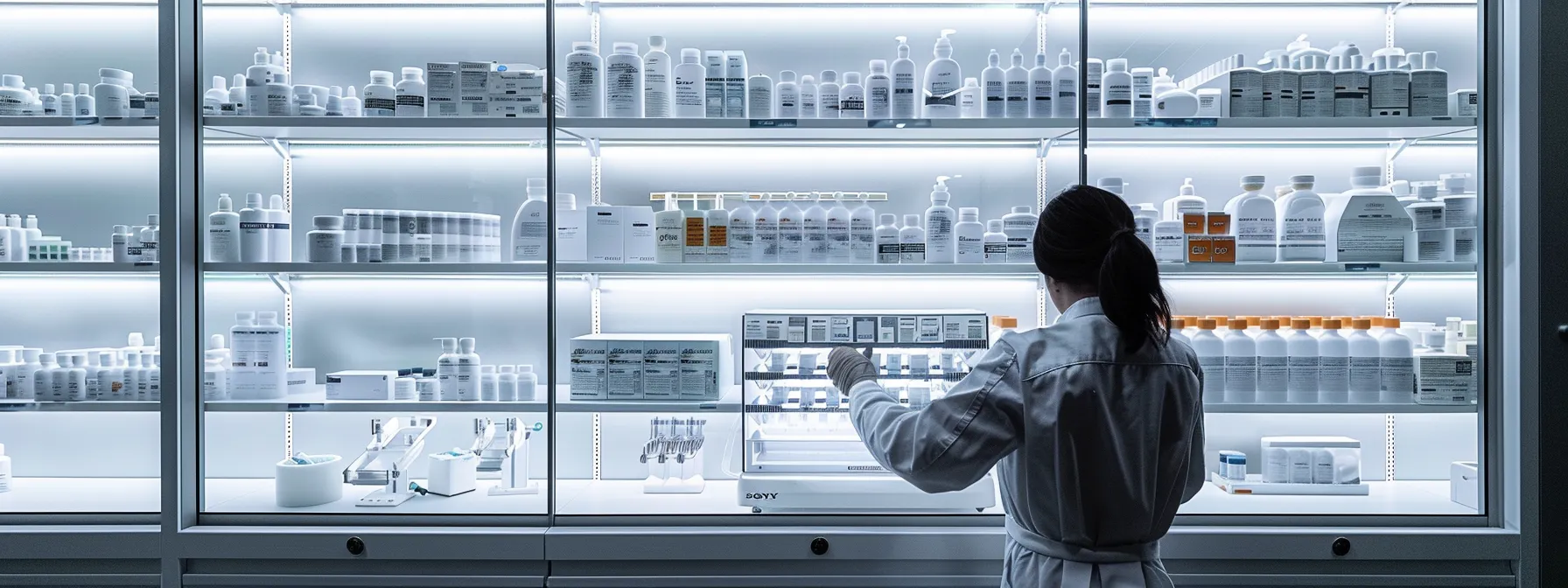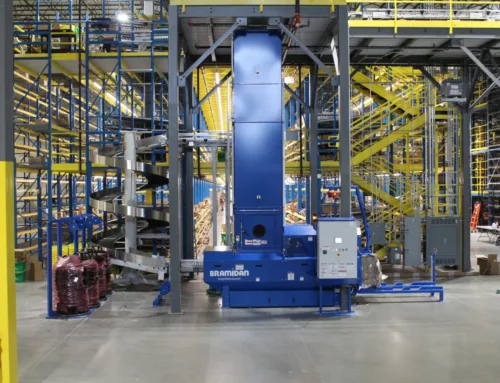
Choosing the right compounding pharmacy equipment supplier can significantly impact your operation’s efficiency and compliance, especially when handling sensitive medications like controlled substances. This guide will help you understand your specific equipment needs, evaluate supplier experience and reputation, and assess product quality and compliance. By following these steps, you’ll ensure that your pharmacy maintains the highest standards in prescription compounding, ultimately benefiting your patient care efforts. If you’re facing challenges in selecting the right supplier or ensuring the quality of your medical devices, this article provides essential insights to navigate the process effectively.
Key Takeaways
- Assess your compounding pharmacy’s equipment needs to ensure regulatory compliance and safety
- Collaborate with physicians to understand specific medication preparation requirements and improve efficiency
- Research suppliers thoroughly for quality, certifications, and customer support before making a decision
- Evaluate pricing, financing options, and total cost of ownership to manage pharmacy budgets effectively
- Ensure reliable maintenance and technical support to maintain operational efficiency and patient care quality
Understand Your Compounding Pharmacy Equipment Needs

Identifying essential equipment for your compounding pharmacy is crucial for efficient operations. I encourage you to assess your inventory of pumps and other devices necessary for medication preparations. Additionally, determine any specialized equipment requirements specific to your practice. Lastly, consider future expansion and upgrades Contact Us to ensure compliance with regulations and evolving needs.
Identify Essential Equipment for Your Practice
As a pharmacy professional, I know the importance of identifying essential equipment tailored to our unique practices. For example, ensuring compliance with regulations requires the right compounding equipment, such as precise measurement devices and sterile compounding hoods that promote safety. Additionally, incorporating personal protective equipment safeguards both the pharmacy staff and the customers from potential hazards during the compounding process.
When assessing your needs, I recommend collaborating with physicians to understand their specific requirements for medication preparations. This can guide your decision on equipment distribution, ensuring that you have the necessary tools to meet patient demands efficiently. By investing in high-quality equipment that aligns with regulations, your pharmacy can enhance operational effectiveness and ultimately improve customer satisfaction.
Determine Specialized Equipment Requirements
Determining specialized equipment requirements for compounding is essential to ensure the safe and effective preparation of personalized medicine. I have found that selecting equipment that complies with Food and Drug Administration (FDA) standards is crucial to maintaining our pharmacy’s credibility and operational efficiency. For instance, investing in precise dose measuring devices guarantees that each drug is compounded according to the specific needs of our patients, reducing the risk of errors and enhancing treatment outcomes.
Additionally, collaborating with suppliers who understand the nuances of compounding pharmacy needs can further streamline this process. I recommend evaluating suppliers based on their range of specialized equipment, such as sterile compounding hoods and automated mixing systems. These tools will not only improve our workflow but also ensure that we deliver high-quality medications tailored to patient requirements, ultimately fostering trust and satisfaction among the healthcare providers we serve.
Plan for Future Expansion and Upgrades
When planning for future expansion and upgrades in a compounding pharmacy, it’s vital to consider the types of therapy and medical equipment that will meet evolving patient needs. As a pharmacy professional, I emphasize the importance of selecting suppliers who offer a range of laboratory equipment that is compatible with your practice’s goals. This foresight will not only cater to current demands but also facilitate seamless integration of new technologies as your pharmacy grows.
Additionally, establishing strong relationships with suppliers can provide insights into emerging trends in long-term care and compounding therapy. By staying informed through these connections, I can make informed decisions about necessary upgrades and expansions, ensuring that my pharmacy is equipped with state-of-the-art equipment that enhances patient outcomes and operational efficiency. Here are key considerations for future planning:
- Assess current and potential therapy needs.
- Evaluate laboratory equipment that supports compliance and safety.
- Collaborate with suppliers for insights on new technologies.
- Understand long-term care demands to plan equipment needs.
Choosing the right equipment is just the beginning. Next, you must look closely at your suppliers, for their experience and reputation matter more than you might think.
Evaluate Supplier Experience and Reputation

Researching a supplier’s background and industry standing is key when selecting compounding pharmacy equipment. I look for customer reviews and testimonials to gauge satisfaction and reliability. Additionally, checking for relevant certifications and accreditations, such as those aligned with the United States Pharmacopeia, is crucial for ensuring that the equipment meets health care standards and fits well within our cleanroom supply chain.
These evaluations guide me in making informed decisions about which pharmacy equipment suppliers can best meet our operational needs, ultimately supporting our commitment to safe, effective, and compliant medication preparation.
Research Supplier Background and Industry Standing
When selecting suppliers for compounding pharmacy equipment, I emphasize the importance of researching their background and industry standing. A thorough examination of their history not only reveals their experience but also helps gauge their reliability and compliance with health standards. For instance, suppliers like End2End Logix have established a reputation for providing high-quality equipment tailored for both human and veterinary needs, which is essential for ensuring we meet various practice requirements.
I often seek out customer reviews and detailed testimonials that reflect previous partnerships with suppliers. This insight allows me to evaluate product performance and the level of customer service offered. If I ever need more information or have specific questions about Veterinary Equipment or other supplies, I feel comfortable reaching out to suppliers directly. For this reason, I recommend contacting suppliers directly to understand their offerings better and assess how well they align with my pharmacy’s unique needs.
Read Customer Reviews and Testimonials
Reading customer reviews and testimonials is a vital step for me when selecting compounding pharmacy equipment suppliers. These insights provide a firsthand look at the experiences other pharmacies have had with suppliers, helping me gauge not only the reliability of the equipment but also the level of customer service I can expect. For instance, positive reviews about the quality of sterile compounding hoods or precise measuring devices can confirm that a supplier meets industry standards, essential for maintaining compliance and safety in my operations.
I also pay attention to any negative feedback, as it can reveal potential issues with specific products or services. In my experience, suppliers that address complaints transparently often indicate a commitment to customer satisfaction and product reliability. By prioritizing reviews and testimonials, I can make informed decisions that align with my pharmacy’s needs, ensuring that I partner with suppliers capable of supporting my commitment to effective medication preparation.
Check for Relevant Certifications and Accreditations
When selecting compounding pharmacy equipment suppliers, I make it a priority to check for relevant certifications and accreditations. Certifications from recognized organizations, such as the United States Pharmacopeia (USP) or the Food and Drug Administration (FDA), indicate that the supplier adheres to strict quality standards. This is essential, as it ensures the equipment I invest in meets safety and regulatory requirements, which ultimately protects my patients and my practice.
Additionally, I evaluate suppliers based on their industry-specific certifications that reflect their expertise and reliability. For instance, a supplier with certifications related to sterile compounding equipment demonstrates their commitment to providing high-quality products that ensure patient safety. By thoroughly assessing these credentials, I can confidently select suppliers that align with my pharmacy’s operational needs and uphold the highest standards in medication preparation.
Trust is built through experience, but it is the quality of the products that truly matters. Next, we’ll explore how to ensure that what you choose meets the highest standards of reliability and compliance.
Assess Product Quality and Compliance

To select the best compounding pharmacy equipment suppliers, I focus on assessing product quality and compliance. This involves ensuring that all equipment meets regulatory standards, verifying the quality of materials and craftsmanship, and reviewing warranty and service agreements. These critical factors not only safeguard patient safety but also ensure that I invest in reliable products that support the operational efficiency of my pharmacy.
Ensure Compliance With Regulatory Standards
Ensuring compliance with regulatory standards is foundational for selecting compounding pharmacy equipment suppliers. I prioritize suppliers that consistently meet the stringent requirements set by the Food and Drug Administration (FDA) and the United States Pharmacopeia (USP). This commitment to compliance guarantees that the equipment I choose not only meets high-quality benchmarks but also safeguards patient safety and supports my pharmacy’s operational integrity.
In my experience, verifying compliance goes beyond checking certifications; it involves reviewing the suppliers’ quality assurance processes. I find it vital to request documentation that outlines their adherence to industry standards, as this transparency reflects their dedication to maintaining safe practices. When suppliers can demonstrate their compliance with regulatory standards, I feel more confident in the reliability of the equipment, which ultimately impacts the quality of care I provide to my patients.
Verify Quality of Materials and Craftsmanship
When I evaluate potential suppliers for compounding pharmacy equipment, verifying the quality of materials is a top priority. I insist on suppliers who use high-grade, durable materials in their products, as this directly impacts the safety and efficacy of compounding processes. Equipment that has been constructed with superior materials not only stands the test of time but also reduces the risk of contamination or malfunction, vital for a successful compounding practice.
Additionally, I pay close attention to the craftsmanship involved in the equipment’s production. Engaging with suppliers who provide transparent information about their manufacturing processes allows me to ensure that stringent quality control measures are in place. This is essential, as meticulous craftsmanship contributes to the performance and reliability of the equipment, ultimately affecting our ability to deliver quality care to patients and maintain compliance with industry regulations.
Review Warranty and Service Agreements
When I consider potential equipment suppliers, reviewing warranty and service agreements is essential. These agreements provide insights into the level of support I can expect after the purchase, particularly regarding maintenance, repairs, and the lifespan of the equipment. A solid warranty not only protects my investment but also reflects the supplier’s confidence in the quality of their compounding pharmacy equipment.
Additionally, I carefully examine the terms of service agreements to understand what is included in the support package. It’s vital to know if the supplier offers on-site service, training for pharmacy staff, or access to troubleshooting resources. By obtaining clarity around these agreements, I can ensure that my pharmacy is well-equipped to handle any potential equipment issues, thereby upholding safety and compliance standards essential for patient care:
- Assess warranty terms for coverage duration and conditions.
- Evaluate service agreements for included support options.
- Ensure clarity on maintenance and repair processes.
Having confirmed the quality and compliance, it’s time to look deeper. The supplier’s product range holds the tools that can enhance your pharmacy’s every operation.
Explore the Supplier’s Product Range and Services

When selecting compounding pharmacy equipment suppliers, I emphasize examining the variety of equipment they offer. It’s vital to look for customization and scalability options that can adapt to my practice’s specific needs. I also assess the training and support services available, as these elements ensure that we get the most out of our investment and enhance our operational efficiency.
Examine the Variety of Equipment Offered
When selecting a compounding pharmacy equipment supplier, I prioritize examining the variety of equipment they offer. A supplier with a comprehensive range ensures that I can find all the necessary tools, from precision scales to sterile compounding hoods, that meet my pharmacy’s specific needs. This variety helps facilitate seamless workflows, allowing me to handle medication preparations efficiently while maintaining compliance with industry standards.
Moreover, I look for suppliers who provide customizable options to adapt to our unique practice requirements. Having access to specialized equipment, such as automated mixing systems or enhanced storage solutions, enables me to tailor our setup for optimal performance. The ability to explore diverse product offerings ensures that I can invest in equipment that not only meets current demands but also supports our growth and evolution in the compounding pharmacy landscape.
Look for Customization and Scalability Options
When evaluating potential suppliers, I prioritize those who offer customization options for compounding pharmacy equipment. Customizability allows me to select tools that fit my specific compounding processes, ensuring they align with the unique needs of my practice. For instance, having the ability to modify equipment like sterile compounding hoods or automated mixing machines enhances my workflow and efficiency, ultimately benefiting patient care.
Scalability is another critical factor I consider in suppliers. As my pharmacy grows and patient demands evolve, I need equipment that can adapt without requiring a complete overhaul of my existing setup. I look for suppliers who provide scalable solutions, allowing me to add or upgrade equipment as needed without significant disruption. This flexibility supports my long-term operational goals and ensures that I consistently meet regulatory standards without compromising quality.
Assess Training and Support Services
When selecting a compounding pharmacy equipment supplier, I find that assessing their training and support services is crucial for ensuring a smooth operational experience. Effective training programs not only equip my staff with the necessary skills to handle specialized equipment but also reinforce compliance with safety standards, which is essential in our field. I prioritize suppliers who offer comprehensive training sessions tailored to their specific products, as this enhances my team’s confidence and efficiency in medication preparation.
Additionally, ongoing support services such as technical assistance and troubleshooting resources are vital for maintaining the performance of the compounding pharmacy equipment. I seek suppliers that provide readily accessible customer support, ensuring that any issues can be addressed promptly to avoid disruption in our workflows. By partnering with suppliers that prioritize training and support, I can enhance my pharmacy’s operational efficiency and focus on delivering high-quality patient care.
Now that we’ve seen what the supplier offers, it’s time to consider what it costs. Let’s look at the pricing and the flexibility that comes with it, keeping your budget in mind.
Compare Pricing and Financial Flexibility

In evaluating compounding pharmacy equipment suppliers, I focus on comparing pricing and financial flexibility. I analyze costs across multiple suppliers to ensure I receive the best value for my investments. Investigating financing and leasing options allows me to manage cash flow efficiently, while calculating the total cost of ownership is crucial for understanding long-term expenses. These factors significantly impact my decision-making process.
Analyze Costs Across Multiple Suppliers
When analyzing costs across multiple suppliers, I focus on obtaining detailed quotes that outline not only the initial purchase price but also any additional fees that may arise. For instance, some suppliers may offer lower upfront costs but charge higher service fees or maintenance rates, which could impact my long-term budgeting. By comparing these aspects carefully, I can make more informed decisions that align with my pharmacy’s financial goals and operational needs.
Furthermore, I always consider the overall value a supplier offers alongside their pricing. This includes evaluating the quality of their equipment, their support services, and any training programs available to my staff. A slightly higher price for superior equipment and excellent support often leads to long-term savings and enhanced pharmacy efficiency, ultimately benefiting patient care and safety. By maintaining this focus on both costs and value, I can ensure that I choose suppliers who truly meet my compounding pharmacy’s needs.
Investigate Financing and Leasing Options
When evaluating potential suppliers for compounding pharmacy equipment, I prioritize investigating financing and leasing options to maintain cash flow while acquiring necessary tools. Many suppliers offer flexible payment plans that can significantly reduce the burden of upfront costs, allowing me to obtain high-quality equipment without straining our budget. This approach ensures that I can invest in essential equipment while preserving financial resources for other operational needs.
Leasing options also provide a practical solution for my pharmacy, enabling me to use the latest technology without the commitment of full ownership. By exploring various financing terms, such as lease-to-own agreements, I can evaluate which option aligns best with my long-term goals. This not only enhances financial flexibility but also ensures our pharmacy remains equipped with the most relevant and efficient compounding pharmacy equipment available:
- Assess available financing options for cost-effectiveness.
- Explore leasing agreements for flexibility in equipment use.
- Evaluate lease-to-own agreements for long-term investment benefits.
- Consider cash flow to maintain operational stability.
Calculate Total Cost of Ownership
Calculating the total cost of ownership (TCO) is essential when selecting compounding pharmacy equipment suppliers. This process involves not only the initial purchase price but also ongoing expenses such as maintenance, repairs, and the lifespan of equipment. By understanding the TCO, I can make better investment decisions that ensure my pharmacy remains financially stable while providing high-quality medication preparations.
To accurately calculate TCO, I assess both direct and indirect costs associated with the equipment. This includes evaluating warranty agreements and any potential downtime that may affect our operations. By analyzing all factors impacting expenses, I gain a comprehensive understanding of what each supplier offers, ultimately guiding me toward the best option that aligns with my pharmacy’s budget and operational needs:
- Consider initial purchase price along with ongoing maintenance costs.
- Evaluate warranty agreements for protection against defects.
- Analyze potential downtime impacts on pharmacy operations.
Pricing matters, but support can make all the difference. Let’s look at how delivery and customer service can shape your experience.
Review Delivery and Customer Support Capabilities

When selecting compounding pharmacy equipment suppliers, it’s essential to evaluate their delivery and customer support capabilities. I focus on checking delivery times and shipping logistics to ensure prompt equipment arrival. Additionally, I assess the availability of technical support, as timely assistance can be crucial in maintaining operations. Inquiring about maintenance and repair services further ensures that my pharmacy can sustain efficient workflows while adhering to safety standards.
Check Delivery Times and Shipping Logistics
When I select compounding pharmacy equipment suppliers, checking delivery times and shipping logistics is a critical step. I prioritize suppliers who provide clear timelines for when I can expect my orders to arrive. Prompt delivery is essential, as delays can disrupt our operations and impact medication preparation schedules. I’ve found that reliable suppliers often have established shipping processes that consistently meet or exceed delivery expectations.
In my experience, I also consider the shipping options available, such as expedited delivery for urgent needs. Understanding the logistics involved helps me ensure that equipment arrives safely and in a timely manner. By asking questions about their shipping practices, I can confirm that the supplier takes the necessary precautions to prevent damage during transit. This attention to detail reinforces my trust in their capability to support my pharmacy’s operational efficiency.
Evaluate Technical Support Availability
When selecting compounding pharmacy equipment suppliers, I emphasize the importance of evaluating their technical support availability. A reliable supplier should offer timely assistance, especially during critical moments when equipment issues arise. I look for suppliers that have a dedicated technical support team, ready to address any questions or concerns regarding the equipment‘s operation, maintenance, or troubleshooting.
Moreover, I believe that ongoing support is vital for maintaining operational efficiency. I prefer suppliers who provide multiple support channels, such as phone, email, or live chat, to ensure I can access help when needed. Fast and effective technical support not only minimizes downtime but also reinforces my confidence in the equipment I’ve chosen, ultimately ensuring we deliver safe and accurate patient care:
- Assess supplier availability of technical support.
- Evaluate responsiveness and expertise of support staff.
- Consider multiple support channels for accessibility.
Inquire About Maintenance and Repair Services
When I evaluate compounding pharmacy equipment suppliers, I prioritize inquiring about their maintenance and repair services. Reliable service support is crucial, as equipment downtime can severely impact our workflow and patient care. Knowing that a supplier offers prompt maintenance and dependable repair options gives me confidence that I can maintain operational efficiency and compliance with health regulations.
I also look for clarity on the response times for service calls and whether they provide on-site support or remote assistance. Understanding these aspects helps me gauge how quickly I can expect resolution for any potential equipment issues. Having access to thorough support not only safeguards my investment in high-quality compounding equipment but also ensures that I can consistently deliver safe and accurate medications to my patients.
Conclusion
Selecting the best compounding pharmacy equipment suppliers is vital for ensuring efficient operations and patient safety. By thoroughly evaluating potential suppliers based on their experience, product quality, and compliance with regulations, I can confidently choose partners that align with my pharmacy’s needs. Additionally, understanding pricing options and the importance of technical support allows me to make informed financial decisions while guaranteeing continuous care. Ultimately, choosing the right equipment suppliers enhances operational efficiency and fosters trust within the healthcare community, ensuring we provide exceptional patient care.
Share This Story, Choose Your Platform!
Get In Touch
Phone: (847) 722-6942
Email: sales@end2endlogix.com
Web: end2endlogix.com


